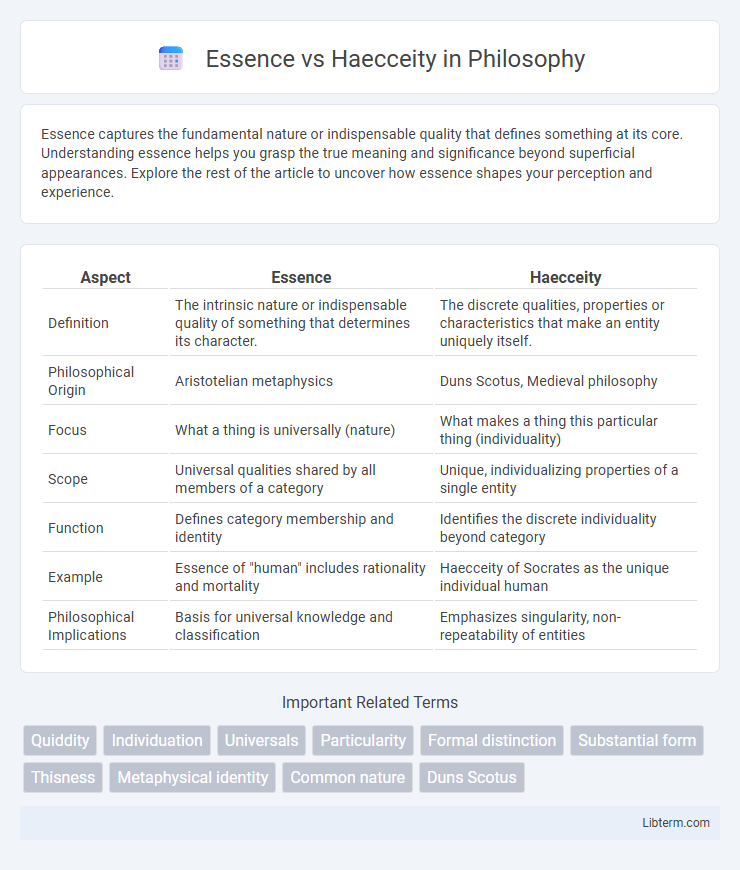Essence captures the fundamental nature or indispensable quality that defines something at its core. Understanding essence helps you grasp the true meaning and significance beyond superficial appearances. Explore the rest of the article to uncover how essence shapes your perception and experience.
Table of Comparison
| Aspect | Essence | Haecceity |
|---|---|---|
| Definition | The intrinsic nature or indispensable quality of something that determines its character. | The discrete qualities, properties or characteristics that make an entity uniquely itself. |
| Philosophical Origin | Aristotelian metaphysics | Duns Scotus, Medieval philosophy |
| Focus | What a thing is universally (nature) | What makes a thing this particular thing (individuality) |
| Scope | Universal qualities shared by all members of a category | Unique, individualizing properties of a single entity |
| Function | Defines category membership and identity | Identifies the discrete individuality beyond category |
| Example | Essence of "human" includes rationality and mortality | Haecceity of Socrates as the unique individual human |
| Philosophical Implications | Basis for universal knowledge and classification | Emphasizes singularity, non-repeatability of entities |
Understanding Essence: The Core of Being
Essence defines the fundamental nature or intrinsic qualities that make an entity what it is, serving as the core of being. It encompasses the necessary attributes without which the entity cannot be identified, distinguishing it from mere accidental properties. Understanding essence involves recognizing these defining features that persist despite change, providing stability and identity to objects or concepts in metaphysical study.
Defining Haecceity: The Principle of ‘Thisness’
Haecceity, derived from the Latin term meaning 'thisness,' is the metaphysical principle that identifies the unique individuality of an entity, distinguishing it from all others. Unlike essence, which refers to the shared attributes defining a category of beings, haecceity captures the singular properties that make an individual entity precisely itself. Philosophers such as Duns Scotus emphasize haecceity as the crucial factor in explaining identity and individuation beyond general characteristics or qualities.
Philosophical Origins: Essence and Haecceity Through History
Essence originates from Aristotelian metaphysics, defining the intrinsic qualities that make an entity what it fundamentally is, while Haecceity, introduced by Duns Scotus in the Middle Ages, denotes the discrete individuality that distinguishes one entity from all others. Essence addresses the common attributes shared within a category, whereas Haecceity emphasizes uniqueness beyond universal characteristics. Historically, Essence laid the foundation for essentialism, and Haecceity challenged it by focusing on particularity and individuality in metaphysical discussions.
Essence in Metaphysics: Universal Characteristics
Essence in metaphysics refers to the universal characteristics that define the fundamental nature of a thing, distinguishing what it is from what it is not. These essential qualities are necessary and invariant properties shared by all instances of a particular kind, forming the basis for classification and understanding in ontology. Essence contrasts with haecceity, which pertains to the unique, individualizing features that make a particular entity distinct from others within the same category.
Haecceity in Metaphysics: Uniqueness and Individuality
Haecceity in metaphysics denotes the discrete qualities that confer individuality and uniqueness to an entity, distinguishing it from all others. Unlike essence, which captures the general nature or attributes shared by a group, haecceity emphasizes the self-contained, irreducible specificity that defines a particular being or object. Philosophers use haecceity to explore identity, emphasizing how singular existence cannot be fully explained by universal properties alone.
Key Thinkers: Aristotle, Duns Scotus, and Beyond
Aristotle's concept of essence defines the fundamental nature or "whatness" (quidditas) that makes an entity what it is, emphasizing universal properties inherent in objects. Duns Scotus introduced haecceity, or "thisness," highlighting the individuating principle that distinguishes one entity from all others, focusing on particularity rather than universality. Later philosophical developments expanded haecceity to explore identity and individuation, influencing metaphysics and ontology debates concerning the nature of being and uniqueness.
Essence vs Haecceity: Main Differences
Essence refers to the intrinsic nature or indispensable quality that defines an entity, making it what it fundamentally is, while haecceity denotes the unique individuality or "thisness" that distinguishes one particular entity from all others. Essence is concerned with universal attributes shared by all members of a category, whereas haecceity focuses on singularity and particularity that cannot be replicated. The main difference lies in essence emphasizing common characteristics essential to identity, while haecceity highlights the distinct, non-transferable properties unique to an individual entity.
Practical Implications in Identity and Classification
Essence defines the fundamental attributes that make an entity what it is, serving as the basis for consistent classification and identity across contexts. Haecceity captures the unique, individualizing properties that distinguish one entity from another even within the same class. In practical terms, essence enables reliable categorization in systems like taxonomy, while haecceity supports precise identification critical in legal, forensic, and personalized applications.
Criticisms and Debates: Contemporary Perspectives
Criticisms of essence vs haecceity often focus on the challenge of clearly distinguishing between an object's essential properties and its unique thisness, with contemporary philosophers debating whether haecceity provides meaningful metaphysical insight or merely rephrases individuation issues. Some argue that essence captures necessary identity conditions effectively, while haecceity remains an elusive concept lacking empirical support. Current discussions emphasize the implications of this debate for ontology, metaphysics of identity, and the philosophy of language, highlighting divergent views on whether haecceity contributes to explanatory power or complicates philosophical frameworks unnecessarily.
Essence and Haecceity in Modern Thought
Essence in modern thought refers to the intrinsic nature or fundamental qualities that define an entity's identity across all possible worlds, emphasizing universal and immutable attributes. Haecceity, contrastingly, highlights the individualizing properties that confer uniqueness to an entity, stressing singularity and non-repeatability beyond general characteristics. Contemporary philosophy debates these concepts when addressing identity, existence, and individuality, particularly in metaphysics and ontology, where essence underscores commonality while haecceity underscores particularity.
Essence Infographic

 libterm.com
libterm.com